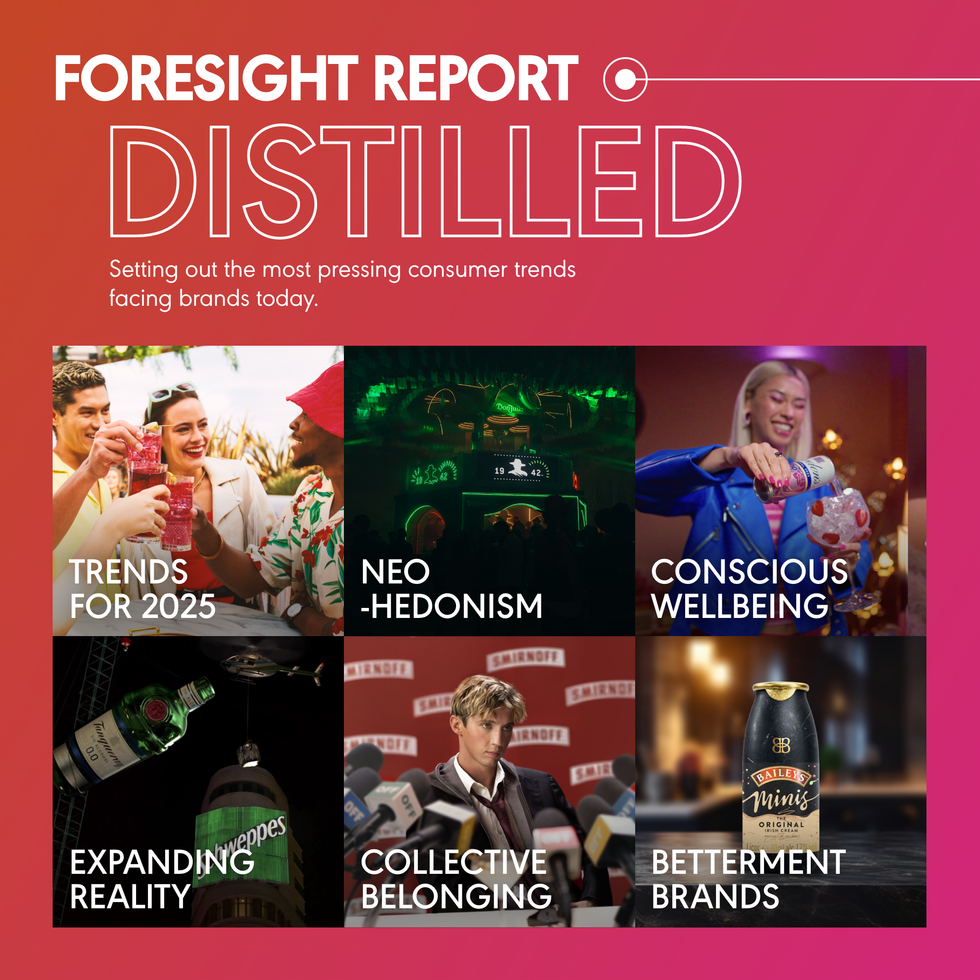Diageo, maker of Johnnie Walker, Don Julio Tequila and Guinness, has unveiled its annual global trends report which reveals how and why consumers will socialise over the next year.
Based on AI analysis of over 160 million online conversations across the world, Distilled 2025 offers detailed insights into what is driving discussions globally and the current trends shaping consumer decision-making.
This year’s edition builds on the success of the inaugural Distilled report. In its first version, the study uncovered and classified five key global consumer trends: Neo-Hedonism, Conscious Wellbeing, Expanding Reality, Collective Belonging and Betterment Brands. In this year’s report, Diageo has explored how these five macro trends have evolved over the past 12 months and used them to offer new foresights into trends likely to shape consumer behaviour this year.
The report identifies that in 2025 we will see a further rise in consumers:
- Practicing moderate drinking by ‘zebra striping’ - the behaviour of alternating between alcoholic and non-alcoholic beverages during a single social occasion. This reflects the broader rise the report uncovered in online conversations around self-care, wellness and slower social interactions: a 79 per cent year-on-year growth in discussions around “decelerated occasions” (one of the largest increases identified) and a 37 per cent rise in discussions around ‘celebrating self-love’.
- Spending more time and money on single unique products or experiences – or making the most of ‘one night only’ to create once in a lifetime memories. The report found that conversations about making the most of unique products and events have risen 83 per cent year-on-year (5.6 million conversations) alongside a 42 per cent increase in consumers talking about alternative social spaces such as virtual reality gaming lounges, hybrid physical-digital venues or pop-up bars – all offering new ways for people to connect and socialise.
- Integrating AI into their daily lives: Conversations around AI-enabled relationships are up across every region globally – 83 per cent worldwide with the largest growth in Europe (96%) and North America (91%). The report explores how as AI evolves, it will likely become a more trusted aid in navigating daily choices and how this is already being seen through everyday consumer applications from banking digital assistants to fitness apps with personalised training plans and real-time health insights, transforming the relationship between consumers and brands as a result.
- Seeking deeper connections in online and offline communities: The report shows a 121 per cent surge globally in discussions about connecting passionate fandoms – over 32 million conversations and the highest conversation increase identified.
“Distilled 2025 delves into the biggest trends shaping socialising this year - from the rise of the ‘zebra striping’ phenomenon to people worldwide wanting to spend their well-earned money on one incredible experience,” Cristina Diezhandino, chief marketing officer at Diageo, commented.
“People socialising goes back thousands of years and by tracking how it evolves, it helps us, and our brands, to stay deeply connected with our consumers.”
Distilled 2025 is a key component of Diageo’s Consumer Choice Framework, a methodology that helps deepen the company’s understanding of consumer motivations and ultimately shape the future of socialising by tracking long-term trends.
The report is powered by Diageo’s Foresight System - a proprietary AI-driven listening tool developed in partnership with data and insight partners Share Creative and Kantar. It combines in-depth quantitative analysis of conversations from an array of online sources including social media platforms, forums and digital media with expert foresights to provide a nuanced understanding of emerging cultural signals and consumer expressions.
Key stand out insights from Europe include:
- On-the-Go Products +63% (vs +45% globally)
- AI-Enabled relationship +96% (vs +83% globally)
- Social Change and Ethics +94% (vs +74% globally)







